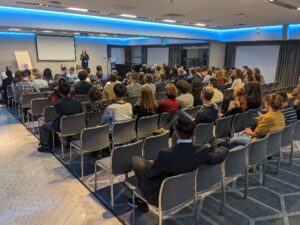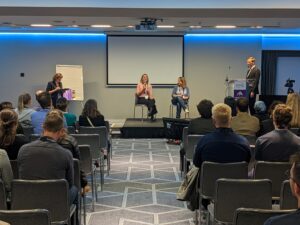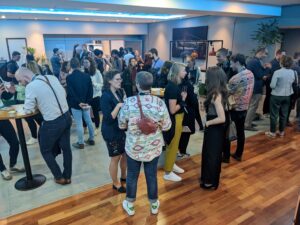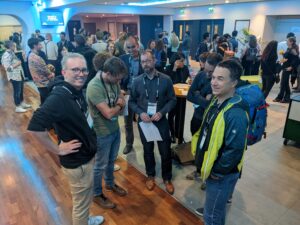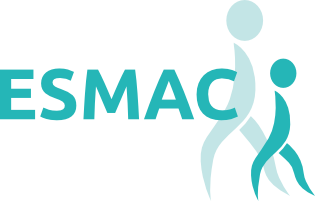Past ECN Events
This area holds our past ECN information and resources, preserved for reference and learning. All recordings connected to this content are available in the Members Section, where our community can easily access and revisit them.
ECN Spotlight webinar 2025
The ECN committee would like to invite you all to our October Webinar, where we put the spotlight on the winner of the third Dr. Tom Shannon Emerging Scientist Award, which was awarded to Dr. Inti Vanmechelen (Postdoctoral Researcher, Karolinska Institutet) at the recent Annual Meeting in Basel.
- Speaker: Dr. Inti Vanmechelen graduated Magna Cum Laude as a Movement Scientist with a master’s in Research in Biomedical Kinesiology. She performed her masters internship at the Gait Lab in Guy’s Hospital (London), where she additionally wrote an award-winning paper on muscle volume estimations in ambulatory children with CP. She performed her PhD at the KU Leuven in Bruges, focusing on upper limb movement patterns in children with dyskinetic cerebral palsy. Throughout her PhD, she worked on unraveling the complex upper limb motion patterns in children with dyskinetic cerebral palsy using three-dimensional motion analysis and wearable sensors. Additionally, during her PhD, she validated the use of the Dyskinesia Impairment Scale for children and adolescents with inherited and idiopathic dystonia and developed a shortened version of this scale using Rasch Analysis.
Currently, she works as a postdoctoral research fellow at KI KBH on 3D gait analysis data of children with CP. The objective of this postdoctoral project is to develop a research database collecting gait analysis and clinical examination data of retrospective clinical data. This data will be used to validate gait pattern classifications using both 3D gait analysis as well as video data. Finally, longitudinal follow-up will be explored to assess the long-term effect of different interventions on ambulatory function in children with CP and their gait classification pattern.
Conference Presentation Skills: What Works and What to Avoid
Presenting at a conference is a valuable opportunity to share your research, build your network, and make your mark in your field – but it can also be daunting. How do you design slides or posters that keep your audience engaged? What strategies help you speak with confidence and clarity? How do you handle tricky questions?
These skills are especially important for PhD students preparing to present their work to an international academic audience for the first time. In this webinar, our invited speakers will share practical tips and personal experiences from both sides of the presentation, as presenters and as audience members.
Join us for an interactive, experience-based session designed to help you prepare and deliver effective conference presentations. Whether you’re getting ready for your first talk or aiming to take your presentation skills to the next level, this webinar will give you concrete strategies to communicate your research with impact.
- Speaker: Prof. Lanie Gutierrez Farewik, PhD, Professor of Biomechanics at KTH Royal Institute of Technology (Stockholm, Sweden)
Finding Balance and Building Resilience in Academia
Navigating an academic career, especially in an international context, can be as challenging as it is rewarding. Balancing research, teaching, personal life, and long-term career planning often feels overwhelming. Setbacks are inevitable, yet they can also become turning points for growth and reflection.
This webinar is designed for all prospects who are seeking practical strategies to manage work-life balance and build resilience in the face of academic challenges. Our speaker, Monica Munaretto, will share real experiences of setbacks, recovery, and adaptation from missed opportunities to burnout and beyond. Join us for an honest, supportive Webinar about what it means to thrive in academia, not just professionally, but personally.
- Speakers: Monica Munaretto PhD, Graduate and Postdoctoral Programming Specialist (Waterloo, ON, Canada)
Application process for international position – experiences, tips & tricks
Applying for international academic positions can feel overwhelming, especially when you’re navigating different systems, expectations, and cultural norms. What makes a strong application stand out? How do you write a compelling motivational letter? What are the common mistakes to avoid? These questions are especially relevant for Master’s students, PhDs, and early PostDocs preparing to take the next step in their academic careers. In this webinar, our invited speakers will share personal insights from both sides of the application process, as candidates and as reviewers.
Join us for a practical, experience-based session designed to help you approach international applications with clarity and confidence. Whether you’re preparing your first academic CV or refining your job package, this webinar will provide valuable tips to strengthen your materials and strategy.
Speakers:
- Asst. Prof. Jordan Cannon PhD, Professor in Biomechanics at the University of Waterloo (Waterloo, ON, Canada)
- Assoz. Prof. Mag. Hans Kainz PhD, Professor in Neuromechanics at the University of Vienna (Vienna, Austria)
How to write my first journal article?
Writing your first scientific journal article can be both exciting and challenging – even if you’ve read countless papers before. How do you establish a clear logical flow in the Introduction? What makes an effective figure or table? How should you write the Discussion section? You may find yourself spending an entire day perfecting just one paragraph! These challenges are common among PhD students, and this webinar is here to help. Our invited speaker will provide an overview of scientific writing, sharing valuable insights and personal experiences from publishing the first article.
- This webinar is designed for PhD students looking to navigate the writing process with confidence and clarity. Join us for practical guidance and expert tips to make your first publication a success!
- Speaker: Dr Francesco Cenni PhD, postdoctoral researcher at University of Brescia, Italy
The ins and outs of founding a start-up/spin-off
During this webinar, the speakers will share their experiences regarding founding a start-up or spin-off. ‘How did they get started?’, ‘Do they do this with a team?’, ‘Do they have tips and tricks for founding a spin-off/start-up?’, ‘How long did it take to get it started/founded?’, ‘What are their future plans with this spin-off/start-up?’.
-
- Oisín Lennon – founder of Danu Sports (Ireland). https://www.danusports.com/
- Alberto Botter and Giacinto Luigi Cerone – founders of ReC Bioengineering Laboratories (Italy). https://recbioengineering.com/
Spotlight on the Winner of the Promising Scientist Award by Hans Kainz
We put the spotlight on the winner of the second Dr. Tom Shannon Promising Scientist Award that was awarded to Dr. Hans Kainz (University of Vienna) at the recent annual meeting in Oslo.
Hans is establishing his Neuromechanics Research group at the Department for Biomechanics, Kinesiology and Computer Science in Sports of the University of Vienna. His research focuses on using 3D motion analysis, motor control studies, neuro-musculoskeletal computer simulations and personalized models based on medical images, to enhance our understanding of movement problems in various groups, including children with cerebral palsy, athletes and obese people. His work strives to improve clinical decision-making in people with movement disorders and enhance evidence-based motor rehabilitation after injuries or orthopedic interventions.
From academia to industry – and back
During this webinar the speakers will share their experiences regarding transitions between academia and industry. Why did they decide to move to industry? What is it like to work in industry? What are the differences between a career in academia versus industry? What are benefits and pitfalls of an academic profile within industry? How do you sell your academic skills for an industry position? Furthermore, experiences regarding collaboration between academia and industry will be shared during this webinar.
Speakers
- To Industry:Dr. Kim Duffy – Senior Product Manager Life Sciences at Vicon (United Kingdom).
Dr. Maud van den Bogaart – VLAIO innovation mandate holder (Post-doctoral researcher) at Hasselt University (Belgium) - And back:Dr. Yvette Kerkum – Business Developer at the Faculty Rehabilitation Sciences at Hasselt University (Belgium).
Moving abroad: international experience and the Marie Skłodowska-Curie Actions
Marie Skłodowska-Curie Actions (MSCA) are a set of prestigious research grants funded by the European Union, with the aim to support researchers at various stages of their careers, from early-stage researchers to experienced professionals. The MSCA are part of the Horizon 2020 program, the EU’s largest research and innovation program.
But how do you start applying for a MSCA? What difficulties are you faced with during this process? And what do you learn from it? In this webinar, we will hear from three researchers who have navigated the MSCA application process. They will each share their firsthand experiences, challenges faced, and valuable insights gained along the way.
| Speakers |
Dr. Janneke Schwaner is a postdoctoral researcher at the Human Movement Biomechanics Research Group at KU Leuven in Belgium. She is currently a MSCA postdoctoral fellowship recipient. Despite initially facing an unsuccessful application, she achieved a perfect score upon reapplication.
Dr. Helga Haberfehlner is a postdoctoral researcher at the Rehabilitation Sciences group at KU Leuven in Belgium. She has been awarded an MSCA Seal of Excellence FWO grant. She achieved this recognition by ranking highly on the reserve list for the Marie Skłodowska-Curie Actions Postdoctoral Fellowship. Dr James Greig Inglis is a post-doctoral researcher at the Department of Clinical and Experimental Sciences, Università degli Studi di Brescia in Italy. He is a MSCA postdoctoral fellowship recipient. |
Public and patient involvement in research – why bother?
Public and patient involvement (PPI) is becoming more and more important in research and aims to involve the public and patients in planning and doing research throughout a research project. Inspired by the motto ‘Nothing about us, without us’, PPI seeks to place the patient centrally within the research process, enabling more impactful, feasible and relevant research outputs. PPI is becoming an increasingly important topic in our field. While differences exist between countries, increasingly funders are requiring PPI to be included within research proposals, projects and dissemination. But how do you include PPI in your research? Do you routinely involve members of the public and/or patients as equal members of your research team? Do you think the opinions and insights of a patient or member of the public would add value to your research team? If you were to include PPI within your research, what steps would you take to make this happen?
Speakers:
- Dr Manjula Manikandan PhD MSc (Appl. Physio), BSc (Physio), postdoctoral researcher in the CP-Life Research Centre, RCSI University of Medicine and Health Sciences, Dublin
- Jessica Burke MA (Psych.) MSc (Clin. Neurosc.) BA. Researcher, CP-Life Research Centre, RCSI University of Medicine and Health Sciences, Dublin, Ireland
How to effectively and constructively review a manuscript
We would like to invite you to our next webinar, which is made possible by Gait and Posture:
ECN webinar on How to effectively and constructively review a manuscript – insights from an editor
on Wed Dec 13th, 10.00-11.30 am CET (Amsterdam)
In this Webinar, editors Harald Boehm and Morgan Sangeux will give tips and insights into the review process from an editor’s perspective. This is your chance to see how you can become a (n even more) effective and constructive reviewer. And ask all your questions to an editor!
Spotlight on the Winner of the Promising Scientist Award by Tamaya van Criekinge
After a very successful in-person ECN network meeting at the ESMAC conference, we would like to invite you all to our Fall ECN Webinar! This Webinar we will put the spotlight on the winner of the first Dr. Tom Shannon Promising Scientist Award that was awarded to Dr. Tamaya van Criekinge at the annual meeting in Athens.
Tamaya will present her past, current, and future work plans.
ECN Spotlight webinar:
Trunk control and gait: challenges and opportunities for healthy aging and stroke rehabilitation by Tamaya van Criekinge.
On Oct 25th, 3.00 pm CEST time (Amsterdam)
Tamaya is a rising postdoc at KU Leuven who aims to improve rehabilitation for patients with neurological disorders. She has a special interest in the role of the trunk on balance and motion decline in the aging population. She just returned from a Fullbright funded project with Prof Tanvi Bhatt at the University of Illinois in Chicago. Join this webinar to learn more about Tamaya’s research past, present, and future plans!
How to be a great group leader
with Prof. of Physical Therapy Tanvi Bhatt from the University of Illinois Chicago (UIC) and
Ass. Prof. of Rehabilitation Sciences and Physiotherapy Pieter Meyns from University Hasselt.
During the webinar, Tanvi and Pieter will share their experiences and pitfalls in leading and starting their groups. There will also be an opportunity to ask all your questions directly to our presenters. We encourage you to send in questions in advance, and we will pass them along to make sure they will be discussed during the webinar. We are preparing an interactive webinar so our speakers can adapt to the experience of the audience!
This invitation is directly addressed to the PhD-students, post-docs, and early career researchers within the ESMAC and the ECN, but we would like to extend this invitation to anyone within the ESMAC community who is interested in the topic.
How to write and publish a high-impact paper
This webinar will be hosted by Gait and Posture and delivered by members of the editorial team. The webinar will cover the essential ingredients to writing and publishing a high-impact paper, covering topics such as what to include or not include in your paper, the importance of language, addressing the “so what” question, and how and why papers get cited. There will also be opportunity for Q&A to ask all your questions directly to our seasoned editors. We encourage you to send in questions in advance, and we will pass them along to make sure they will be discussed during the webinar.
This invitation is directly addressed to the PhD-students, post-docs, and early career researchers within the ESMAC and the ECN, but we would like to extend this invitation to anyone within the ESMAC community who is interested in the topic.
Mastering the logistical challenges of international research collaborations
Starting new collaborations is very exciting, but can soon become daunting. Our invited speakers will present their views and experiences on the challenges that come with projects that involve different institutions, sometimes spread across countries. How can we establish international networks, share the data between institutions, and form a good meeting structure? Our speakers will share their tips to achieve a good collaborative dataset and a fruitful exchange.
Invited speakers will be Prof. Dr. Ann-Christin Eliasson, an occupational therapist at the Karolinska Institute in Stockholm and expert in the field of children with neurodevelopmental disorders, and Prof. Dr. Clemens Becker, internist and geriatric specialist at the University of Heidelberg and expert in the field of fall prevention for older adults. After they each share their experiences for half an hour, we will have a general discussion where we are interested in everyone’s experiences and tips, and have room for further discussion with our panellists.
The first ECN webinar: The subtle art of grant writing
On 23 November 2022 we had our first ECN webinar in which we explored ‘The subtle art of grant writing’. The webinar focused on junior and senior postdoctoral researchers. Prof. Nadia Dominici and Prof. Hans Kainz provided their personal experiences and recommendations on applying for a European Research Council (ERC) starting grant (senior postdocs). For the less senior postdoctoral researchers, Jeroen Aeles PhD shared his approach in preparing for and writing an individual postdoctoral Marie Skłodowska-Curie fellowship (MSCA). However, the ERC and MSCA are very competitive and not feasible for everyone, which is why we also highlighted the possibility to apply for smaller grants. These smaller grants could facilitate research visits or be the start of a bigger research project.
We have added a list of funding possibilities in the #funding channel of our ECN Slack community that can be consulted when you are looking for grants. This is an active list, which means that ECN members can add funding possibilities that might be interesting or useful.
We would like to thank the presenters for their time and useful tips, and we appreciated the active participation of the attendees. Check our website for updates on the next webinar, or email us at ecn@esmac.org. You can also research out to this email address if you would like to join our ECN community on Slack.
See you soon!
Marije Goudriaan & Francesco Cenni (ECN members and organizers of the first ECN webinar).
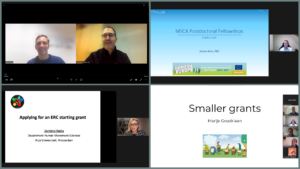
Kick-off meeting 2022
The Kick-off event of the Early Career Network (ECN) took place after the Welcome Cocktail of the 2022 ESMAC conference in Dublin. We were happily surprised as over 100 early researchers filled the seminar room – more than double than we expected!
The event started with a warm welcome of Ayman Assi our ESMAC president and of Lizeth Sloot on behalf of the ECN organizing committee. We gave a short introduction of the ECN team as well as our plans to materialize the network. This was followed by a wonderful panel discussion “Work in networking” with Friedl de Groote and Caroline Steward. We want to thank these two for the insight into their career paths and work which really inspired us for our coming work at the ECN!
After the official part of the Kick-off meeting, we got ourselves ready to get to know our fellow ECN’ers by playing Bingo Mingle under the delight of having snacks and drinks together. We think it is without a doubt that the Kick-off meeting was a complete success!
We thank everyone who attended the Kick-off meeting for their input on shaping the ECN. It was a pleasure to meet and network with all these enthusiastic and motivated researchers and are looking forward to our ECN future! Next years, we will organize an in-person ECN network event at the Annual ESMAC Meetings.
